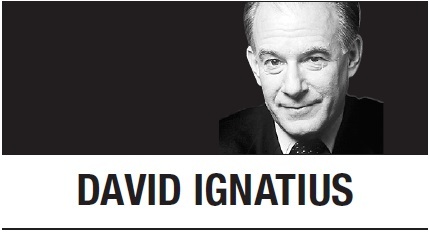[David Ignatius] Can Mueller report provide any resolution?
By David IgnatiusPublished : March 7, 2019 - 17:28
 Robert Mueller’s final report should present Congress with a clean choice: Either the facts warrant impeachment of President Trump, or they don’t. That was the promise of Mueller’s appointment as special counsel: He would gather the evidence, and then Congress and the public could make a judgment.
Robert Mueller’s final report should present Congress with a clean choice: Either the facts warrant impeachment of President Trump, or they don’t. That was the promise of Mueller’s appointment as special counsel: He would gather the evidence, and then Congress and the public could make a judgment. In a country with a healthy political system, Mueller’s report would lead to such a consensus and resolution. But we don’t live in that country.
Instead, congressional Democrats seem to want it both ways. They argue that investigations of Trump should continue (and even expand) after Mueller finishes, but not necessarily through a formal, disciplined impeachment process. Instead, House Speaker Nancy Pelosi seems to envision multiple probes by various committees. She wants to focus on governing and avoid disarray, but the three-ring investigative circus may have the opposite effect.
The Republicans, meanwhile, are continuing their ruinous campaign to investigate the investigators -- further undermining public confidence in the FBI and the intelligence community. California Rep. Devin Nunes astonishingly said Sunday on Fox News that without such a “full scrub ... you’re going to see generations of conservatives who will not trust the Department of Justice, they will not trust the FBI.” That sounded almost like a call to insurrection.
Continuation of our national fever dream -- all Trump, all the time, with no resolution until an incendiary 2020 presidential election -- can’t be in anyone’s interest, except Trump’s. He lives to dominate the national conversation in this way, with a daily spasm of anti-elitism, media-bashing and self-love. We’re all his enablers, Fox News and MSNBC watchers alike.
Ideally, Mueller’s report would bridge existing differences. Parts of it will probably disappoint each side in the debate: He may find less evidence of a criminal conspiracy between Trump and the Russians than MSNBC-world had believed, but more evidence of deliberate, continuing efforts to obstruct justice than Fox-world wants to admit.
Unfortunately, Trump’s game of chicken with Mueller (and GOP acquiescence) almost guarantees division rather than unity. Rather than coalesce around Mueller’s findings, partisans are likely to cherry-pick the parts of the report they like and ignore the rest. In this sense, the Mueller report may prove yet another demonstration of what social scientists call “confirmation bias,” in which people accept facts that affirm the views they already hold and screen out the rest.
As the competing narratives about Trump diverge, arguing the facts becomes harder. Mueller has shielded himself by refusing to speak outside his formal legal pleadings, which have distilled the evidence he has gathered. Hopefully the public version of his report will be similarly precise -- and foster a truly fact-based debate. But it will be an uphill fight.
Constant repetition of lies is a kind of reverse alchemy; it turns precious gold into dross, or simply makes it impossible to tell the difference.
Think of the falsehoods that have become embedded in the public mind: Hillary Clinton’s use of a private email server was a serious felony, punishable by prison; the four Americans killed in Benghazi in 2012 were victims of an Obama administration conspiracy; the Iran nuclear agreement was the “worst deal ever negotiated,” even though (unlike Trump’s North Korea pact) it halted a nuclear program; NAFTA was the “worst trade deal ever made,” even though Trump’s own rewrite made only modest changes. Each lie has been shown to be false, yet each persists.
Mueller’s report will land in a polluted political landscape. Increasingly, nobody seems to believe anything that comes out of Washington -- which, perversely, was the overriding aim of the Russian covert-action program that Mueller was tasked to investigate.
A final problem with leaving the Trump-Russia inquiry festering, post-Mueller, is that it blocks any new dialogue with Moscow about security issues. The debris of 2016 must be cleared before serious contact resumes. Mueller must resolve the collusion issue, and Russia must refrain from sabotaging American politics again. Then, the two countries can start urgent talks about Ukraine, arms control and other issues.
Perhaps Mueller could accompany his report with the equivalent of instructions to the jury: Congress and the public need to understand what crimes the special counsel is alleging and which ones he declines to prosecute. They need guidance about how to weigh the evidence. Most of all, they need advice on whether the facts in this case warrant the constitutional remedy of impeachment.
If Congress decides against impeachment, this case will go to the public in 2020. That will be a raucous and unwieldy jury, just what the Founders feared, but perhaps it will be the only venue left.
David Ignatius
David Ignatius’ email address is davidignatius@washpost.com. -- Ed.
(Washington Post Writers Group)








![[Graphic News] More Koreans say they plan long-distance trips this year](http://res.heraldm.com/phpwas/restmb_idxmake.php?idx=644&simg=/content/image/2024/04/17/20240417050828_0.gif&u=)
![[KH Explains] Hyundai's full hybrid edge to pay off amid slow transition to pure EVs](http://res.heraldm.com/phpwas/restmb_idxmake.php?idx=644&simg=/content/image/2024/04/18/20240418050645_0.jpg&u=20240419100350)





![[From the Scene] Monks, Buddhists hail return of remains of Buddhas](http://res.heraldm.com/phpwas/restmb_idxmake.php?idx=652&simg=/content/image/2024/04/19/20240419050617_0.jpg&u=20240419175937)

![[KH Explains] Hyundai's full hybrid edge to pay off amid slow transition to pure EVs](http://res.heraldm.com/phpwas/restmb_idxmake.php?idx=652&simg=/content/image/2024/04/18/20240418050645_0.jpg&u=20240419100350)

![[Today’s K-pop] Illit drops debut single remix](http://res.heraldm.com/phpwas/restmb_idxmake.php?idx=642&simg=/content/image/2024/04/19/20240419050612_0.jpg&u=)